Legal Analysis: Director's Duties under the Corporations Act 2001
VerifiedAdded on 2021/05/30
|6
|1458
|225
Report
AI Summary
This report provides a detailed legal analysis of director's duties and liabilities under the Corporations Act 2001. The report addresses two key questions: the potential criminal and civil charges faced by Liam and Peta, along with the penalties they may incur, and whether CloudTech can take action against Alexandra regarding a contract and the use of the company's client list. The analysis examines relevant sections of the Corporations Act, including sections 181, 588G, and 588H, as well as the duties of care, diligence, and good faith. It applies these legal principles to the specific facts of each scenario, considering issues such as insolvent trading, breaches of director's duties, misuse of company information, and conflicts of interest. The report concludes with a summary of the findings, assessing the potential legal consequences for each individual involved. The report also references relevant case laws like *ASIC v Hellicar* and *Salomon v A Salomon and Co Ltd* to support its arguments.
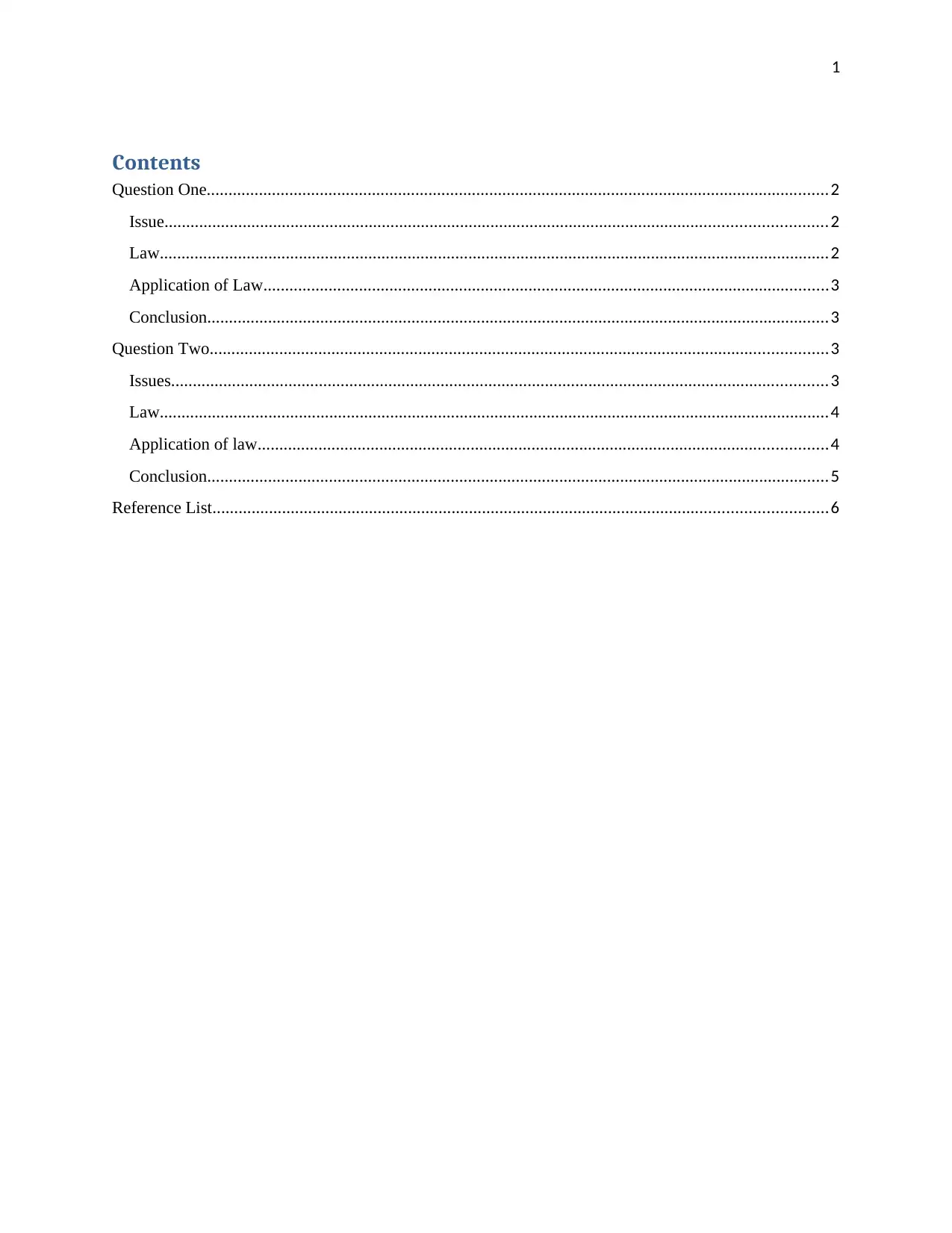
1
Contents
Question One...............................................................................................................................................2
Issue........................................................................................................................................................2
Law..........................................................................................................................................................2
Application of Law..................................................................................................................................3
Conclusion...............................................................................................................................................3
Question Two..............................................................................................................................................3
Issues.......................................................................................................................................................3
Law..........................................................................................................................................................4
Application of law...................................................................................................................................4
Conclusion...............................................................................................................................................5
Reference List.............................................................................................................................................6
Contents
Question One...............................................................................................................................................2
Issue........................................................................................................................................................2
Law..........................................................................................................................................................2
Application of Law..................................................................................................................................3
Conclusion...............................................................................................................................................3
Question Two..............................................................................................................................................3
Issues.......................................................................................................................................................3
Law..........................................................................................................................................................4
Application of law...................................................................................................................................4
Conclusion...............................................................................................................................................5
Reference List.............................................................................................................................................6
Paraphrase This Document
Need a fresh take? Get an instant paraphrase of this document with our AI Paraphraser
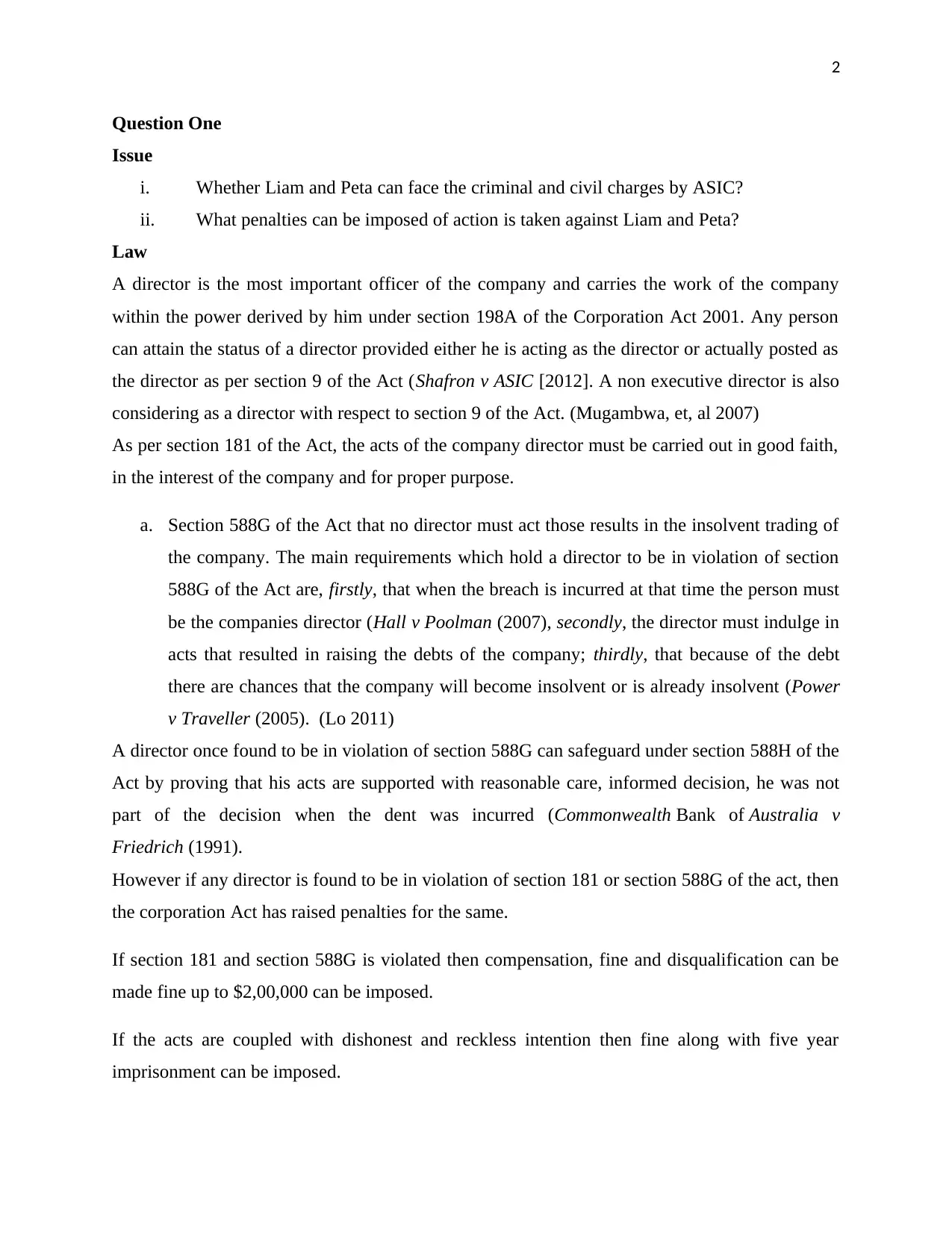
2
Question One
Issue
i. Whether Liam and Peta can face the criminal and civil charges by ASIC?
ii. What penalties can be imposed of action is taken against Liam and Peta?
Law
A director is the most important officer of the company and carries the work of the company
within the power derived by him under section 198A of the Corporation Act 2001. Any person
can attain the status of a director provided either he is acting as the director or actually posted as
the director as per section 9 of the Act (Shafron v ASIC [2012]. A non executive director is also
considering as a director with respect to section 9 of the Act. (Mugambwa, et, al 2007)
As per section 181 of the Act, the acts of the company director must be carried out in good faith,
in the interest of the company and for proper purpose.
a. Section 588G of the Act that no director must act those results in the insolvent trading of
the company. The main requirements which hold a director to be in violation of section
588G of the Act are, firstly, that when the breach is incurred at that time the person must
be the companies director (Hall v Poolman (2007), secondly, the director must indulge in
acts that resulted in raising the debts of the company; thirdly, that because of the debt
there are chances that the company will become insolvent or is already insolvent (Power
v Traveller (2005). (Lo 2011)
A director once found to be in violation of section 588G can safeguard under section 588H of the
Act by proving that his acts are supported with reasonable care, informed decision, he was not
part of the decision when the dent was incurred (Commonwealth Bank of Australia v
Friedrich (1991).
However if any director is found to be in violation of section 181 or section 588G of the act, then
the corporation Act has raised penalties for the same.
If section 181 and section 588G is violated then compensation, fine and disqualification can be
made fine up to $2,00,000 can be imposed.
If the acts are coupled with dishonest and reckless intention then fine along with five year
imprisonment can be imposed.
Question One
Issue
i. Whether Liam and Peta can face the criminal and civil charges by ASIC?
ii. What penalties can be imposed of action is taken against Liam and Peta?
Law
A director is the most important officer of the company and carries the work of the company
within the power derived by him under section 198A of the Corporation Act 2001. Any person
can attain the status of a director provided either he is acting as the director or actually posted as
the director as per section 9 of the Act (Shafron v ASIC [2012]. A non executive director is also
considering as a director with respect to section 9 of the Act. (Mugambwa, et, al 2007)
As per section 181 of the Act, the acts of the company director must be carried out in good faith,
in the interest of the company and for proper purpose.
a. Section 588G of the Act that no director must act those results in the insolvent trading of
the company. The main requirements which hold a director to be in violation of section
588G of the Act are, firstly, that when the breach is incurred at that time the person must
be the companies director (Hall v Poolman (2007), secondly, the director must indulge in
acts that resulted in raising the debts of the company; thirdly, that because of the debt
there are chances that the company will become insolvent or is already insolvent (Power
v Traveller (2005). (Lo 2011)
A director once found to be in violation of section 588G can safeguard under section 588H of the
Act by proving that his acts are supported with reasonable care, informed decision, he was not
part of the decision when the dent was incurred (Commonwealth Bank of Australia v
Friedrich (1991).
However if any director is found to be in violation of section 181 or section 588G of the act, then
the corporation Act has raised penalties for the same.
If section 181 and section 588G is violated then compensation, fine and disqualification can be
made fine up to $2,00,000 can be imposed.
If the acts are coupled with dishonest and reckless intention then fine along with five year
imprisonment can be imposed.
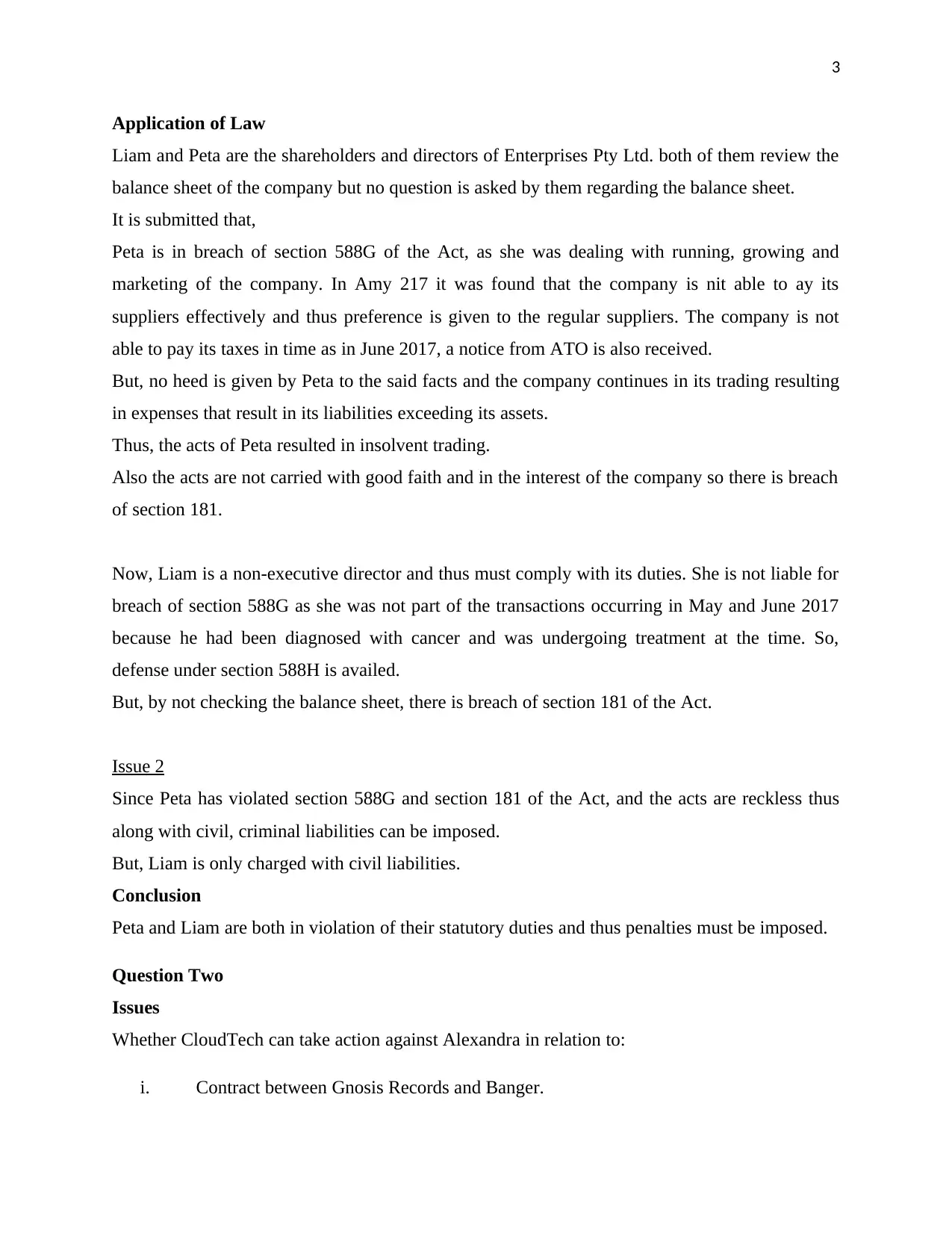
3
Application of Law
Liam and Peta are the shareholders and directors of Enterprises Pty Ltd. both of them review the
balance sheet of the company but no question is asked by them regarding the balance sheet.
It is submitted that,
Peta is in breach of section 588G of the Act, as she was dealing with running, growing and
marketing of the company. In Amy 217 it was found that the company is nit able to ay its
suppliers effectively and thus preference is given to the regular suppliers. The company is not
able to pay its taxes in time as in June 2017, a notice from ATO is also received.
But, no heed is given by Peta to the said facts and the company continues in its trading resulting
in expenses that result in its liabilities exceeding its assets.
Thus, the acts of Peta resulted in insolvent trading.
Also the acts are not carried with good faith and in the interest of the company so there is breach
of section 181.
Now, Liam is a non-executive director and thus must comply with its duties. She is not liable for
breach of section 588G as she was not part of the transactions occurring in May and June 2017
because he had been diagnosed with cancer and was undergoing treatment at the time. So,
defense under section 588H is availed.
But, by not checking the balance sheet, there is breach of section 181 of the Act.
Issue 2
Since Peta has violated section 588G and section 181 of the Act, and the acts are reckless thus
along with civil, criminal liabilities can be imposed.
But, Liam is only charged with civil liabilities.
Conclusion
Peta and Liam are both in violation of their statutory duties and thus penalties must be imposed.
Question Two
Issues
Whether CloudTech can take action against Alexandra in relation to:
i. Contract between Gnosis Records and Banger.
Application of Law
Liam and Peta are the shareholders and directors of Enterprises Pty Ltd. both of them review the
balance sheet of the company but no question is asked by them regarding the balance sheet.
It is submitted that,
Peta is in breach of section 588G of the Act, as she was dealing with running, growing and
marketing of the company. In Amy 217 it was found that the company is nit able to ay its
suppliers effectively and thus preference is given to the regular suppliers. The company is not
able to pay its taxes in time as in June 2017, a notice from ATO is also received.
But, no heed is given by Peta to the said facts and the company continues in its trading resulting
in expenses that result in its liabilities exceeding its assets.
Thus, the acts of Peta resulted in insolvent trading.
Also the acts are not carried with good faith and in the interest of the company so there is breach
of section 181.
Now, Liam is a non-executive director and thus must comply with its duties. She is not liable for
breach of section 588G as she was not part of the transactions occurring in May and June 2017
because he had been diagnosed with cancer and was undergoing treatment at the time. So,
defense under section 588H is availed.
But, by not checking the balance sheet, there is breach of section 181 of the Act.
Issue 2
Since Peta has violated section 588G and section 181 of the Act, and the acts are reckless thus
along with civil, criminal liabilities can be imposed.
But, Liam is only charged with civil liabilities.
Conclusion
Peta and Liam are both in violation of their statutory duties and thus penalties must be imposed.
Question Two
Issues
Whether CloudTech can take action against Alexandra in relation to:
i. Contract between Gnosis Records and Banger.
⊘ This is a preview!⊘
Do you want full access?
Subscribe today to unlock all pages.

Trusted by 1+ million students worldwide
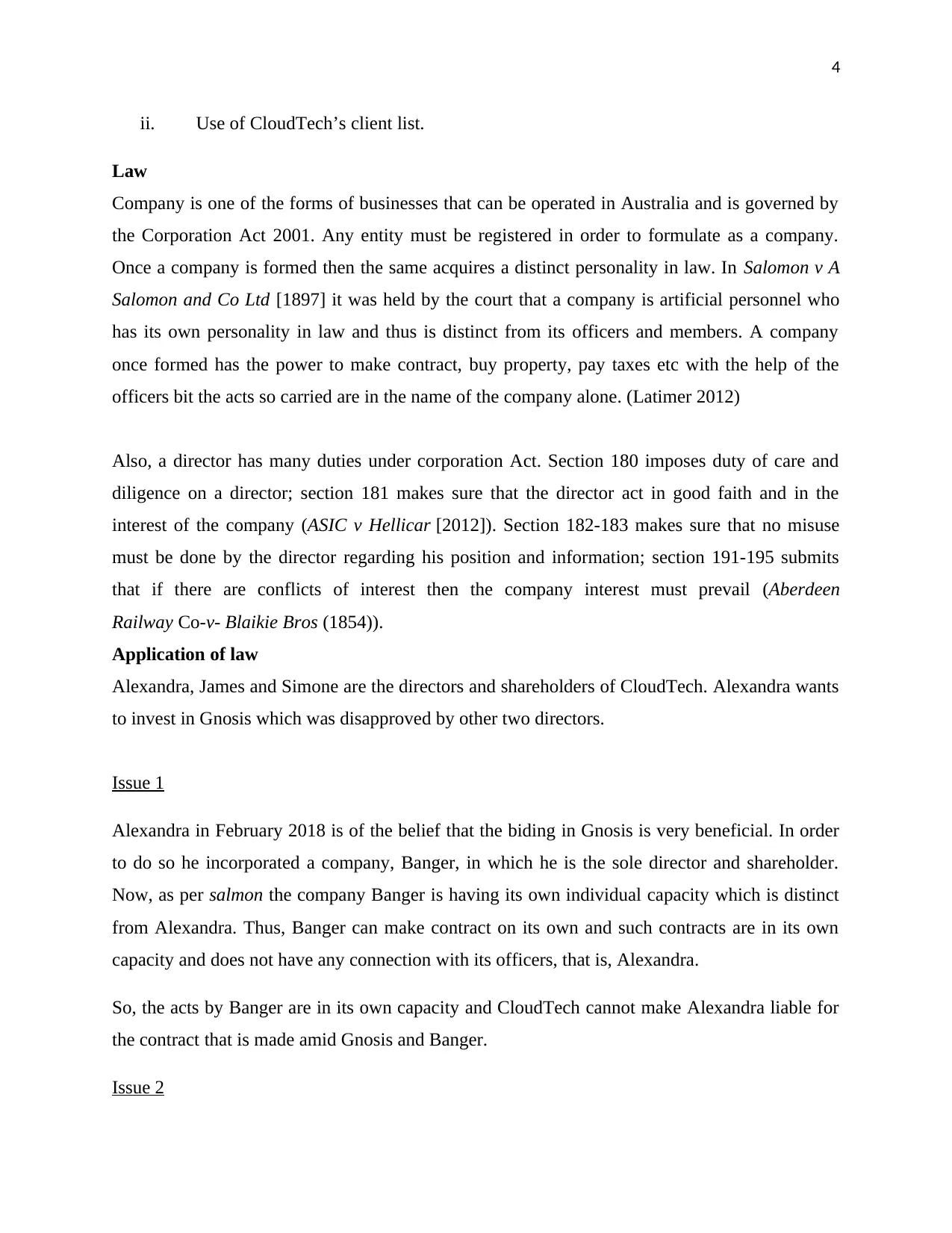
4
ii. Use of CloudTech’s client list.
Law
Company is one of the forms of businesses that can be operated in Australia and is governed by
the Corporation Act 2001. Any entity must be registered in order to formulate as a company.
Once a company is formed then the same acquires a distinct personality in law. In Salomon v A
Salomon and Co Ltd [1897] it was held by the court that a company is artificial personnel who
has its own personality in law and thus is distinct from its officers and members. A company
once formed has the power to make contract, buy property, pay taxes etc with the help of the
officers bit the acts so carried are in the name of the company alone. (Latimer 2012)
Also, a director has many duties under corporation Act. Section 180 imposes duty of care and
diligence on a director; section 181 makes sure that the director act in good faith and in the
interest of the company (ASIC v Hellicar [2012]). Section 182-183 makes sure that no misuse
must be done by the director regarding his position and information; section 191-195 submits
that if there are conflicts of interest then the company interest must prevail (Aberdeen
Railway Co-v- Blaikie Bros (1854)).
Application of law
Alexandra, James and Simone are the directors and shareholders of CloudTech. Alexandra wants
to invest in Gnosis which was disapproved by other two directors.
Issue 1
Alexandra in February 2018 is of the belief that the biding in Gnosis is very beneficial. In order
to do so he incorporated a company, Banger, in which he is the sole director and shareholder.
Now, as per salmon the company Banger is having its own individual capacity which is distinct
from Alexandra. Thus, Banger can make contract on its own and such contracts are in its own
capacity and does not have any connection with its officers, that is, Alexandra.
So, the acts by Banger are in its own capacity and CloudTech cannot make Alexandra liable for
the contract that is made amid Gnosis and Banger.
Issue 2
ii. Use of CloudTech’s client list.
Law
Company is one of the forms of businesses that can be operated in Australia and is governed by
the Corporation Act 2001. Any entity must be registered in order to formulate as a company.
Once a company is formed then the same acquires a distinct personality in law. In Salomon v A
Salomon and Co Ltd [1897] it was held by the court that a company is artificial personnel who
has its own personality in law and thus is distinct from its officers and members. A company
once formed has the power to make contract, buy property, pay taxes etc with the help of the
officers bit the acts so carried are in the name of the company alone. (Latimer 2012)
Also, a director has many duties under corporation Act. Section 180 imposes duty of care and
diligence on a director; section 181 makes sure that the director act in good faith and in the
interest of the company (ASIC v Hellicar [2012]). Section 182-183 makes sure that no misuse
must be done by the director regarding his position and information; section 191-195 submits
that if there are conflicts of interest then the company interest must prevail (Aberdeen
Railway Co-v- Blaikie Bros (1854)).
Application of law
Alexandra, James and Simone are the directors and shareholders of CloudTech. Alexandra wants
to invest in Gnosis which was disapproved by other two directors.
Issue 1
Alexandra in February 2018 is of the belief that the biding in Gnosis is very beneficial. In order
to do so he incorporated a company, Banger, in which he is the sole director and shareholder.
Now, as per salmon the company Banger is having its own individual capacity which is distinct
from Alexandra. Thus, Banger can make contract on its own and such contracts are in its own
capacity and does not have any connection with its officers, that is, Alexandra.
So, the acts by Banger are in its own capacity and CloudTech cannot make Alexandra liable for
the contract that is made amid Gnosis and Banger.
Issue 2
Paraphrase This Document
Need a fresh take? Get an instant paraphrase of this document with our AI Paraphraser
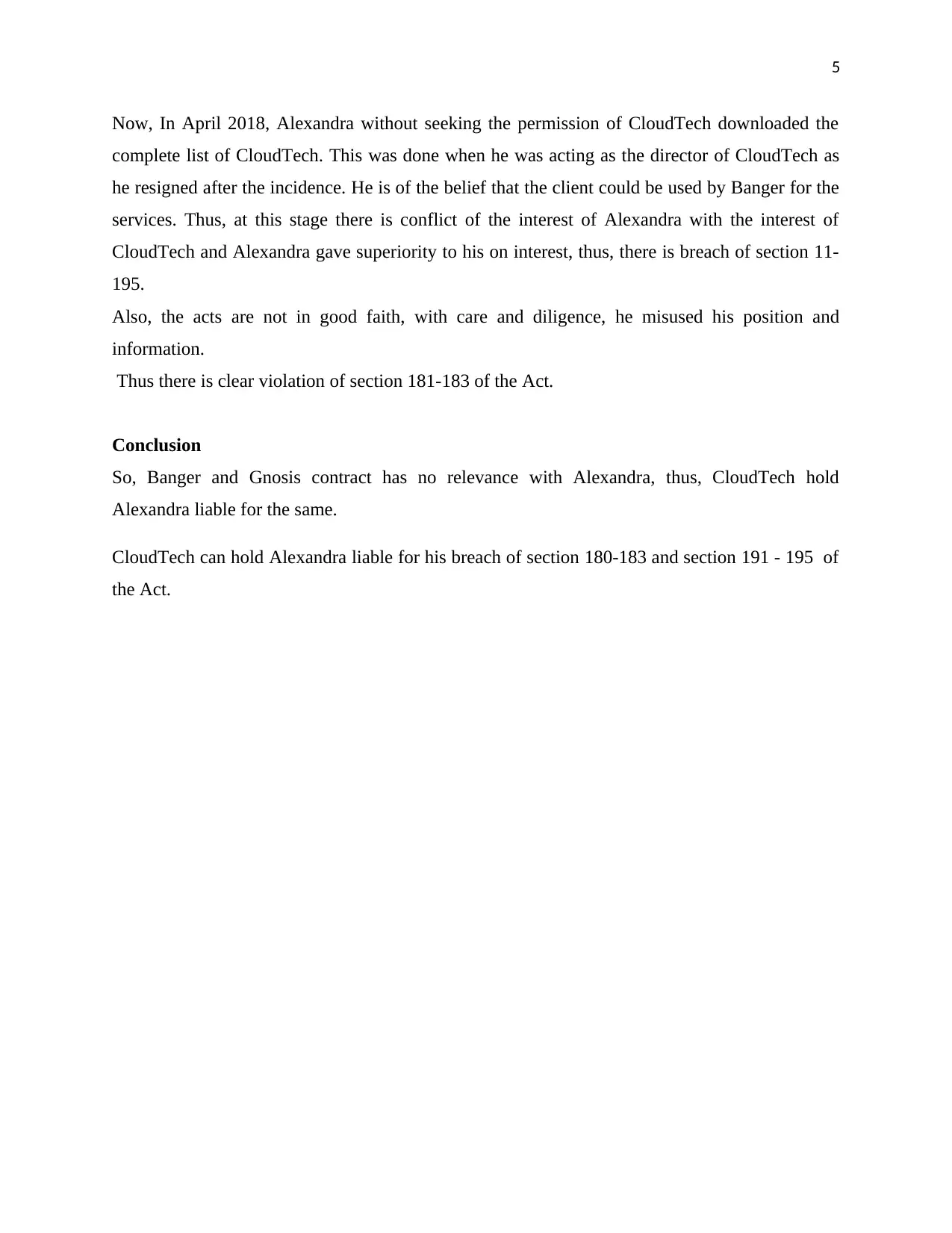
5
Now, In April 2018, Alexandra without seeking the permission of CloudTech downloaded the
complete list of CloudTech. This was done when he was acting as the director of CloudTech as
he resigned after the incidence. He is of the belief that the client could be used by Banger for the
services. Thus, at this stage there is conflict of the interest of Alexandra with the interest of
CloudTech and Alexandra gave superiority to his on interest, thus, there is breach of section 11-
195.
Also, the acts are not in good faith, with care and diligence, he misused his position and
information.
Thus there is clear violation of section 181-183 of the Act.
Conclusion
So, Banger and Gnosis contract has no relevance with Alexandra, thus, CloudTech hold
Alexandra liable for the same.
CloudTech can hold Alexandra liable for his breach of section 180-183 and section 191 - 195 of
the Act.
Now, In April 2018, Alexandra without seeking the permission of CloudTech downloaded the
complete list of CloudTech. This was done when he was acting as the director of CloudTech as
he resigned after the incidence. He is of the belief that the client could be used by Banger for the
services. Thus, at this stage there is conflict of the interest of Alexandra with the interest of
CloudTech and Alexandra gave superiority to his on interest, thus, there is breach of section 11-
195.
Also, the acts are not in good faith, with care and diligence, he misused his position and
information.
Thus there is clear violation of section 181-183 of the Act.
Conclusion
So, Banger and Gnosis contract has no relevance with Alexandra, thus, CloudTech hold
Alexandra liable for the same.
CloudTech can hold Alexandra liable for his breach of section 180-183 and section 191 - 195 of
the Act.
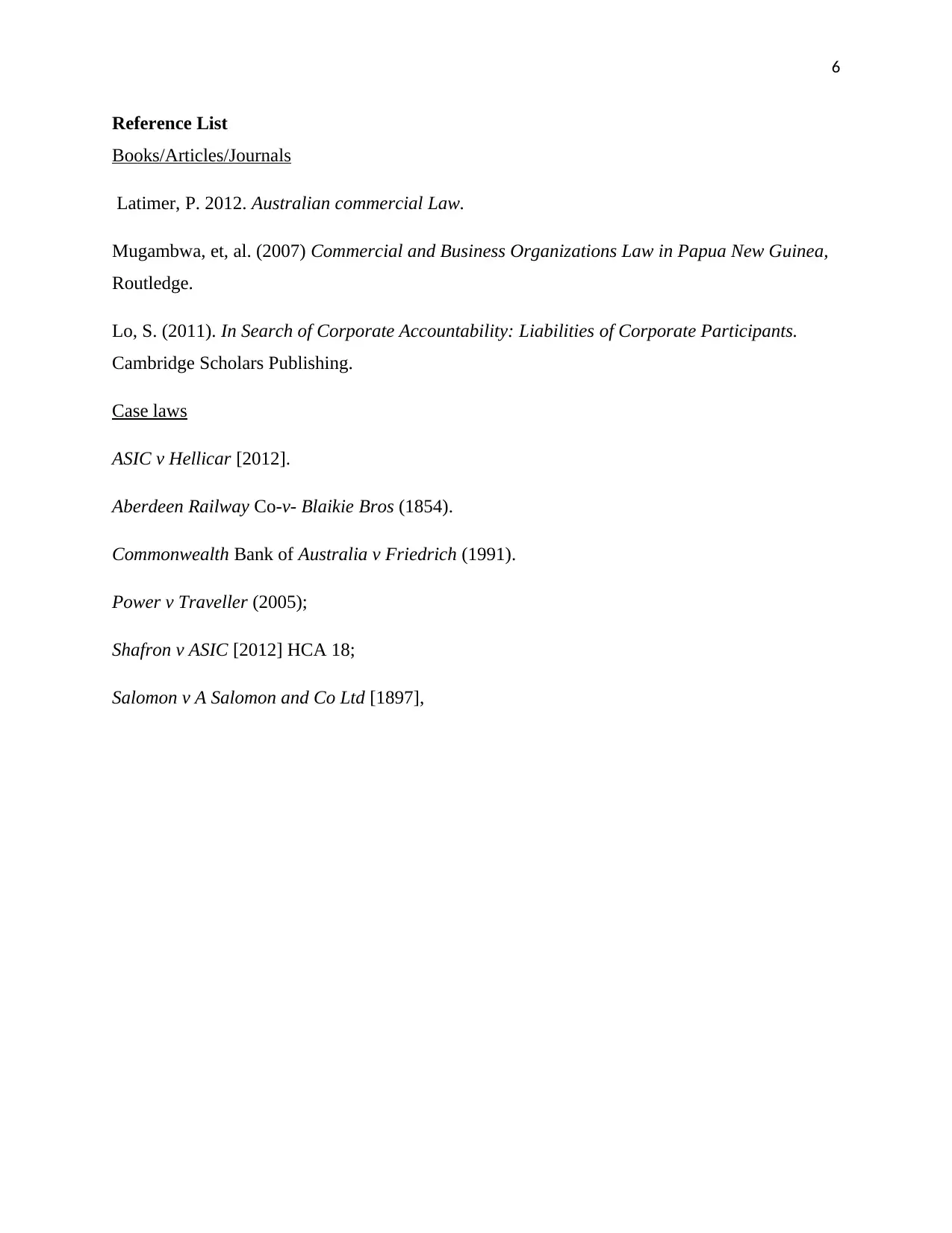
6
Reference List
Books/Articles/Journals
Latimer, P. 2012. Australian commercial Law.
Mugambwa, et, al. (2007) Commercial and Business Organizations Law in Papua New Guinea,
Routledge.
Lo, S. (2011). In Search of Corporate Accountability: Liabilities of Corporate Participants.
Cambridge Scholars Publishing.
Case laws
ASIC v Hellicar [2012].
Aberdeen Railway Co-v- Blaikie Bros (1854).
Commonwealth Bank of Australia v Friedrich (1991).
Power v Traveller (2005);
Shafron v ASIC [2012] HCA 18;
Salomon v A Salomon and Co Ltd [1897],
Reference List
Books/Articles/Journals
Latimer, P. 2012. Australian commercial Law.
Mugambwa, et, al. (2007) Commercial and Business Organizations Law in Papua New Guinea,
Routledge.
Lo, S. (2011). In Search of Corporate Accountability: Liabilities of Corporate Participants.
Cambridge Scholars Publishing.
Case laws
ASIC v Hellicar [2012].
Aberdeen Railway Co-v- Blaikie Bros (1854).
Commonwealth Bank of Australia v Friedrich (1991).
Power v Traveller (2005);
Shafron v ASIC [2012] HCA 18;
Salomon v A Salomon and Co Ltd [1897],
⊘ This is a preview!⊘
Do you want full access?
Subscribe today to unlock all pages.

Trusted by 1+ million students worldwide
1 out of 6
Related Documents
Your All-in-One AI-Powered Toolkit for Academic Success.
+13062052269
info@desklib.com
Available 24*7 on WhatsApp / Email
![[object Object]](/_next/static/media/star-bottom.7253800d.svg)
Unlock your academic potential
Copyright © 2020–2026 A2Z Services. All Rights Reserved. Developed and managed by ZUCOL.





